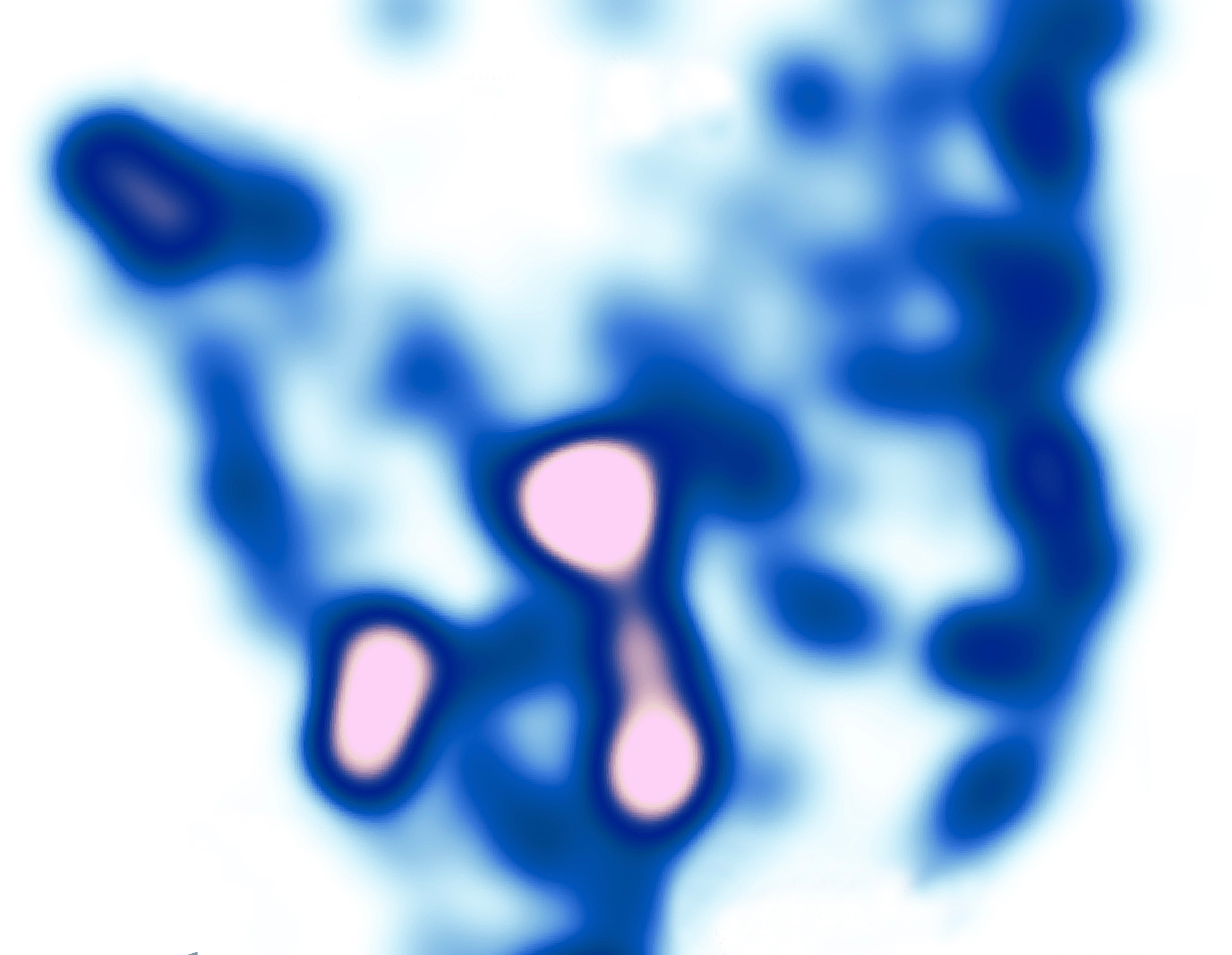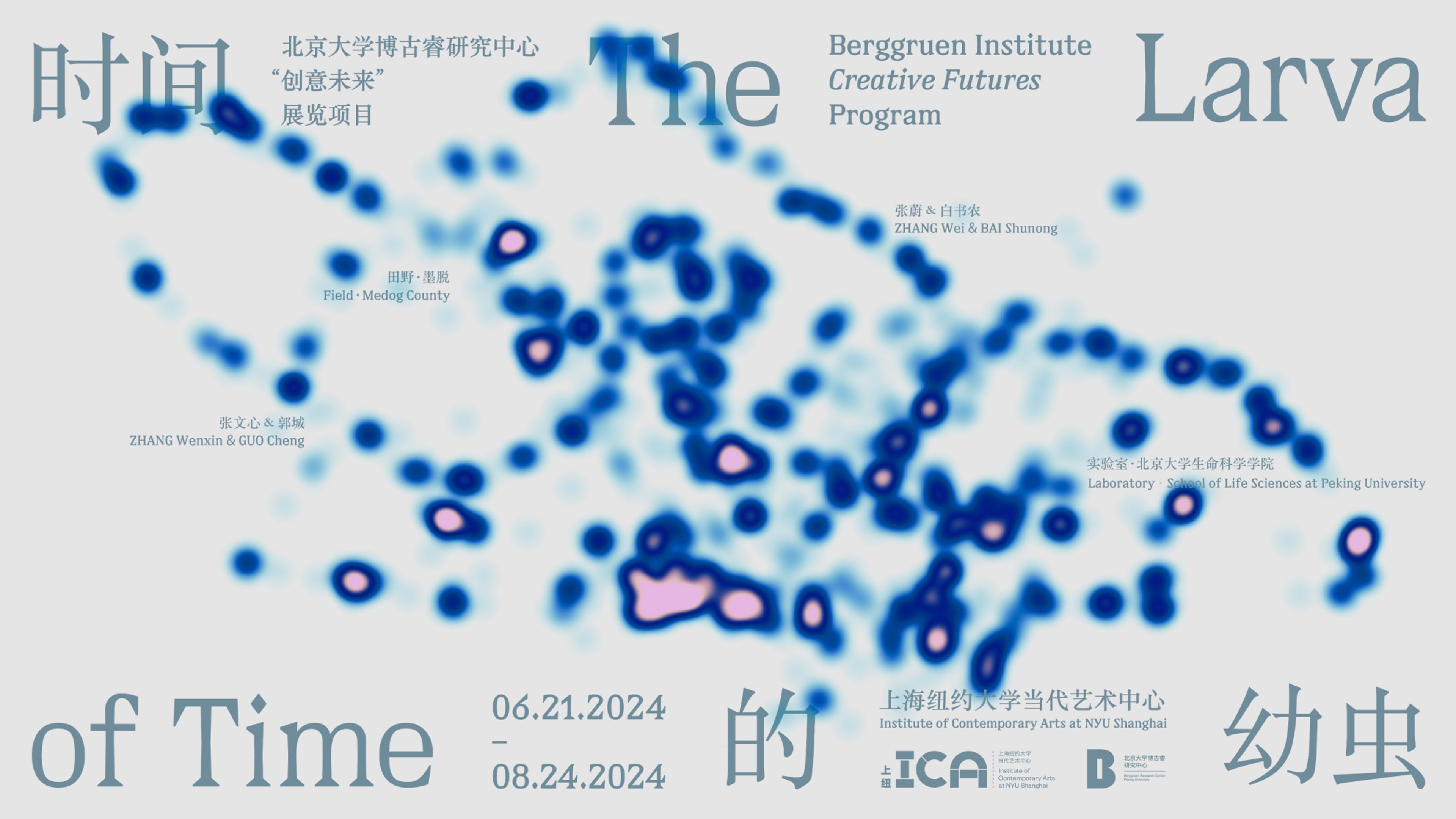The Larva of Time

- Date: June 21, 2024
- Location: Institute of Contemporary Arts (ICA) at NYU Shanghai
The Larva of Time is an interdisciplinary curatorial and research project, realized as part of the “Creative Futures” initiative at the Berggruen Research Center at Peking University and exhibited in partnership with the Institute of Contemporary Arts (ICA) at NYU Shanghai. Commenced in the summer of 2022, The Larva of Time invited artists and scientists to investigate unnoticed temporal imprints in the processes of artistic and scientific research, exploring the contextual resonances between art and science. Curated by 2022-23 Berggruen Fellow Iris LONG, the exhibition features eleven works, co-created by the exhibiting artists and scientists BAI Shunong, GUO Cheng, ZHANG Wei, and ZHANG Wenxin, all derived from the project’s research and commissions.
Time, an epistemological subject of shared interest among the four participants, has multiple manifestations in this project, ranging from the surface residues of microorganisms to bifurcations and diversity on an evolutionary scale to Earth's shifting geological and ecological epochs. The introduction of the book Arts of Living on a Damaged Planet (University of Minnesota Press, 2017) proposes a concept of time in which contemporary humans sweep across the world, bringing “multiple times” rather than constructing a singular future. Each version of time leaves distinct marks on the Earth, and this conception of time aligns with the temporal notions examined in the exhibition. The Larva of Time is a shared contemplation of metamorphosis, an intimate yet expansive invisible cocoon created by two artists and two scientists over nearly two years through correspondence, visits, dialogues, and fieldwork.
These plural times could be technological, geological, biological, entangled, and buried. Unlike common modes of collaboration between art and science, this project regards the participants as co-creators rather than merely using science as a source of material or a provider of technology, tools, or experiments. The four participants interweave their creative and research processes, temporarily setting aside their original identities and habits. The foundation of this project is not simply interdisciplinary; it is an attempt at something ‘pre-disciplinary,’ something imperfect, unfinished, and larval.
The exhibition is accompanied by a series of related public programs that delve into the exhibition's subject from various perspectives, offering critical, participatory, or playful entry points.
The Larva of Time exhibition is generously supported by the Berggruen Research Center at Peking University, School of Life Sciences at Peking University, and the Institute of Contemporary Arts at NYU Shanghai.
About the Artists
GUO Cheng
GUO Cheng (b.1988 Beijing) is an artist currently living and works in Shanghai. Guo works predominantly in sculpture and installation. His practice mainly focuses on exploring the mutual impact and influence between established and emerging technologies and individuals in the context of culture and social life. Guo Cheng's works often use humorous yet calm language to link grand issues with seemingly arbitrary objects and to provide critical perspectives for discussion.
His recent solo exhibitions include: “The Park”,Sifang Art Museum (2022), “Almost Unmeant”, Magician Space (2020), “Down to Earth", Canton Gallery (2019). Group exhibitions include: Shanshui: Echoes and Signals, M+ Museum (2024), Elemental Constellations, Macalline Center of Art (2023), Macao International Art Biennale: The Statistics of Fortune, Macao Museum of Art (2023), Chengdu Biennale:Time Gravity, Chengdu Art Museum (2023),The 4th Hangzhou Triennial of Fiber Art:Being Theoria, Zhejiang Art Museum (2022), The Pieces I am, UCCA Edge (2022), Time After Time: The Polychronicity in Blockchain, Hyundai Motorstudio (2022), and others.
He obtained New Century Art Foundation “Art Production and Exhibition Support Program” (2022), Porsche “Young Chinese Artist of the Year” Award (2021), Ars Electronica Honorary Mentions (2020); CAC://DKU Research & Creation Fellowship (2020); the Digital Earth fellowship (2018-2019); the Special Jury Prize of Huayu Youth Award (2018); the Bio-Art & Design Award (2017).
ZHANG Wenxin
ZHANG Wenxin (b. 1989) now lives and works in Hangzhou. She received her MFA from California College of the Arts (2013). She sees herself as a terrain builder. Her work is not to build landscapes and wonders, but to simulate the intricate terrain between human and non-human minds. She uses images, films, installations and soundscapes to bring forth perceptual journeys that guide the viewer to dive into the strata where mechanical time and magical time intertwine.
Her solo exhibition include:
“Notes of the Hollow”, MUD Gallery, Shanghai (2022);
“SubSurfacesaṃsvedaja”, Imago Kinetics, Hangzhou (2020);
“Filling the Klein Bottle” (as an artist duo with Xuan Ye), InterAccess, Toronto (2020).
Her works have been shown at Shanghai Biennale (2023), Beijing Biennial (2022), Guangzhou Image Triennial (2011), OCAT BIennial (2021), MUTEK Electronic Festival (2022), Breda Photo (2020), etc,.
She has participated in artist residency programs organized by Pro Helvetia, Goethe Institute and The Center for Photography at Woodstock.
About the Scientists
BAI Shunong
BAI Shunong is Professor Emeritus of the School of Life Sciences, Peking University, and a 2020-2021 Berggruen Fellow. He has worked in plant developmental biology for more than four decades. He had proposed the concept of "plant developmental unit" in 1993, the concept of "sexual reproductive cycle" in 2011, and the theory of “Plant Morphogenesis 123” in 2016. In addition to putting efforts in understanding the underlying principles of plant morphogenesis, he is also highly interested in understanding the meaning of “life”, of “humanity”, of “education”, and the ultimate goal of undergraduate education in life science.
ZHANG Wei
Dr. ZHANG Wei is a PI and PhD supervisor at the School of Life Sciences, Peking University. She graduated from the School of Life Sciences, Peking University, with a Ph.D. degree in Botany in 2011. She was a postdoctoral researcher at the Department of Ecology and Evolution at the University of Chicago from 2012-2017. She has been working at the School of Life Sciences at Peking University and Peking University-Tsinghua Center for Life Sciences since 2018. The Zhang lab integrates experimental and computational biology research methods to explore the theoretical basis and molecular mechanisms of important evolutionary problems, such as using mimicry butterflies as a model to study the mechanisms of biodiversity and adaptation. She is a Committee member of the Entomological Society of China and the vice chairman of the Evolutionary Theory Committee of the Zoological Society of China. She has received grants from the Distinguished Youth Program (National Natural Science Foundation of China), Distinguished Youth Program (Beijing Municipal Natural Science Foundation), Young Professionals of “The Recruitment Plan for High-level Overseas Cultural Talents”and the Feng Foundation of Biomedical Research. Her research results have been published in Cell, Nature, Nature Communications, Science Advances, Genome Biology, Molecular Biology and Evolution.
About the Curator
Iris Long
Iris Long (b.1990) is an independent curator, writer, and a Berggruen Fellow. She is also an amateur radio operator. Her research focuses on China's technological infrastructure, the psychogeography of technology, and astronomy. She has curated/co-curated several exhibitions around art, science and technology, such as “Lying Sophia & Mocking Alexa” (Hyundai Blue Prize), “Blue Cables in Venetian Watercourse” (PSA Emerging Curator Project Award), the art & tech sector of the inaugural Beijing Art Biennale “Earth Heat Flow: the Visitor Who Returns to Solar Time”, “Cosmological Elements”, the first art exhibition by Chinese National Astronomy, and “Cosmic Archaeology” at the Shanghai Astronomy Museum.
She has served as an international jury member for the ISEA Electronic Art Symposium and the SIGGRAPH ASIA Art Gallery. Her research has been presented at the Warburg Institute, the University of London’s Institute of Advanced Studies, and the ZKM Center for Art and Media, among others. She also teaches part-time at Central Saint Martins, University of Arts, London. In 2021, she initiated the “Port: Under the Cloud” project, a long-term research and curatorial project on China's technological infrastructure. Personal website: irislong.xyz
Related Events
Opening Reception & Conversation | The Larva of Time
Friday, 21 June, 16:00–19:00 (17:00 conversation)
ICA Galleries
The conversation will take the audience through the fermentation process of the project over more than two years, leading to a discussion on the durational aspect of interdisciplinary collaboration.
Lecture | Metamorphosis
Friday, 28 June, 18:00–20:30
Location to be confirmed
“Metamorphosis” is both a characteristic of insect life and a term used in English to describe geological changes such as metamorphic rocks. Philosopher Emanuele Coccia's lecture, based on his book Metamorphosis, aims to open new philosophical perspectives on the issues reflected in the exhibition's works.
Talk | Learning about Mountains from Molehills
Saturday, July 13, 14:00–15:30
ICA Galleries
Hu Ruiqi is a young biologist and a participant in the Motuo fieldwork associated with this project. He will synthesize his rich field experience with recent scholarship to discuss insects, the most diverse group of organisms in the biological world.
Workshop | Stone Store: The Petrification of Everyday Objects
Saturday, July 20, 14:00–15:30
ICA Reading Room
“The Petrification of Everyday Objects” is a fictional archeological site reflecting the lives of ordinary people organized by Plant South Salesroom.
- All events are FREE and OPEN to the public.
- All events, except the Opening and Conversation on 21 June, require registration in advance.
- For more details or to register, please visit the ICA website.
About the Organizer
The Berggruen Research Center at Peking University
The Berggruen Research Center at Peking University was established in December 2018. Located at the heart of Peking University, the Center engages with outstanding thinkers on its global platform to examine, share, and develop ideas to address planetary challenges in times of profound transformation.
Intellectual themes for research programs are focused on Frontier Science, Technology, and Philosophy; Creative Futures; and Ancient Wisdom and Planetary Governance. The Center funds a fellowship program, supports publications that feature its major research focuses, hosts activities such as lectures, workshops, and symposia, and produces multi-media outreach programs.
About the Partner
ICA at NYU Shanghai
The Institute of Contemporary Arts (ICA) at NYU Shanghai is a non-profit kunsthalle and research center committed to the development, presentation, and exchange of diverse ideas through contemporary arts. Our commitment is based on a core belief that engagement with art engenders critical thought, creativity, and openness to complexity, across disciplines and society and in everyday life.
As one of the few university-affiliated art institutions in China to focus on contemporary art, the ICA was first established as the NYU Shanghai Art Gallery (2015–17) and reopened to the public with a new mission and reinvigorated vision in 2019. The ICA builds upon the earlier ambitions of the Gallery, while expanding our aims to emphasize experimentation, to further understand art and exhibition-making as a form of research, and to learn from artists living and working today.
